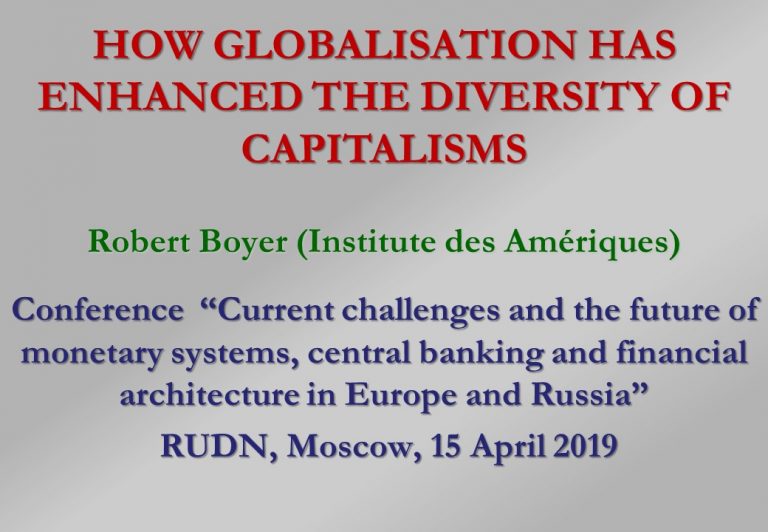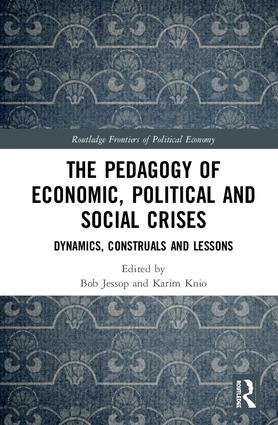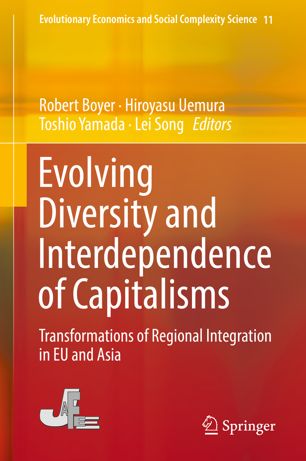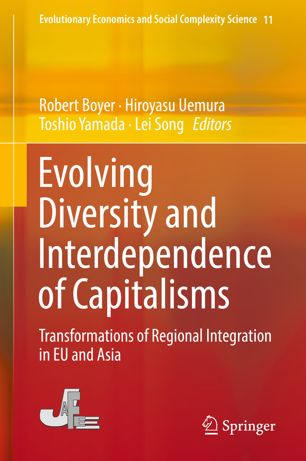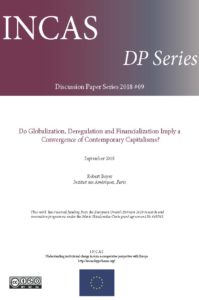Presentation Powerpoint, prepared for the Conference “Current challenges and the future of monetary systems, central banking and financial architecture in Europe and Russia”
RUDN, Moscow, 15 April 2019
Presentation Powerpoint prepared for EACES Workshop « The Rise of State Capitalism: consequences for economic and political development”, Moscow, April 10 and 11, 2019
The pedagogy of economic, political and social crises: Dynamics, construals and lessons, Bob Jessop and Karim Knio (Eds), Routledge: Frontiers of Political Economy, London, New-York, juin 2018, Chapitre 8, p.139-165.
Robert Boyer, Hiroyasu Uemura, Toshio Yamada, Lei Song, in Boyer Robert, Toshio Yamada, and Lei Song (Eds), Evolving Diversity and Interdependence of Capitalisms. Transformations of Regional Integration in EU and Asia, book series (EESCS, volume 11), Springer, Japan KK, part of Springer Nature 2018, p. 459-483.
in Boyer Robert, Toshio Yamada, and Lei Song (Eds), Evolving Diversity and Interdependence of Capitalisms. Transformations of Regional Integration in EU and Asia, book series (EESCS, volume 11), Springer, Japan KK, part of Springer Nature 2018, p. 17-64
Boyer Robert, Toshio Yamada, and Lei Song (Eds), Book, Part of the Evolutionary Economics and Social Complexity Science book series (EESCS, volume 11), Springer, Japan KK, part of Springer Nature 2018
Introduction
This book integrates three levels of political–economic analysis: first a comparative institutional analysis of the varieties of capitalism in both Europe and Asia, second a macroeconomic analysis of industrial structural change and economic dynamics of the national economies in Europe and Asia, and then an encompassing analysis of international production linkages and international financial instability which determine the long-term patterns of regional integration in Europe and Asia. The comparison of the European Union and ASEAN delivers some key conditions for a viable long-term regional economic integration to cope with contrasted capitalisms and growth regimes: either pragmatism in the choice of an exchange rate regime, or a form of fiscal federalism. The reader will also find a genuine analysis of the dynamism of the Chinese economy, a study on institutional changes and de-industrialization in Japan, and the increasing international production linkages among China, Japan, Korea, and ASEAN. It is shown how the enlargement of the European Union and the Euro triggered the diverging competitiveness and macroeconomic performances that led to the crisis of a six decades long economic and political process. This book is the result of long lasting Asian–European collaborative research. It is a milestone in the historical and comparative analysis along the régulation theory that aims at understanding the long-run transformations, renewed diversity and interdependence of capitalisms.
Présentation préparée pour le Séminaire du Centre Cournot «Les fondements et les enjeux de la plate-formisation de l’économie»,Maison des Sciences Economiques, Paris 8 Octobre 2018
Do Globalization, Deregulation and Financialization Imply a Convergence of Contemporary Capitalisms?
Discussion Paper Series 2018 #09: PAR · PUBLIÉ · MIS À JOUR
Abstract
Distinctive political compromises prevailed and explained various brands of capitalism observed from WWII to the early 1990s. Is this key finding by régulation research been still valid given the wide diffusion of common structural changes since the 2000s: slow productivity in the industrialized world, overwhelming impact of finance, rise of inequalities within many Nation-States in response to deregulation, social and political polarization, open conflict between capitalism and democracy, the trading place between mature and emerging economies? These stylized facts challenge most economic theories but they can be explained by an institutionalist and historical approach that also helps in redesigning a relevant macroeconomic approach. Each capitalism brand displays specific complementarities among institutional forms and their growing interactions imply more their complementarity than their frontal competition. Consequently, all capitalisms have been transformed but they do not converge towards a canonical configuration. The rise of nationalist movements may challenge the present international relations but they should not underestimate the economic and social costs of their protectionist strategy.
